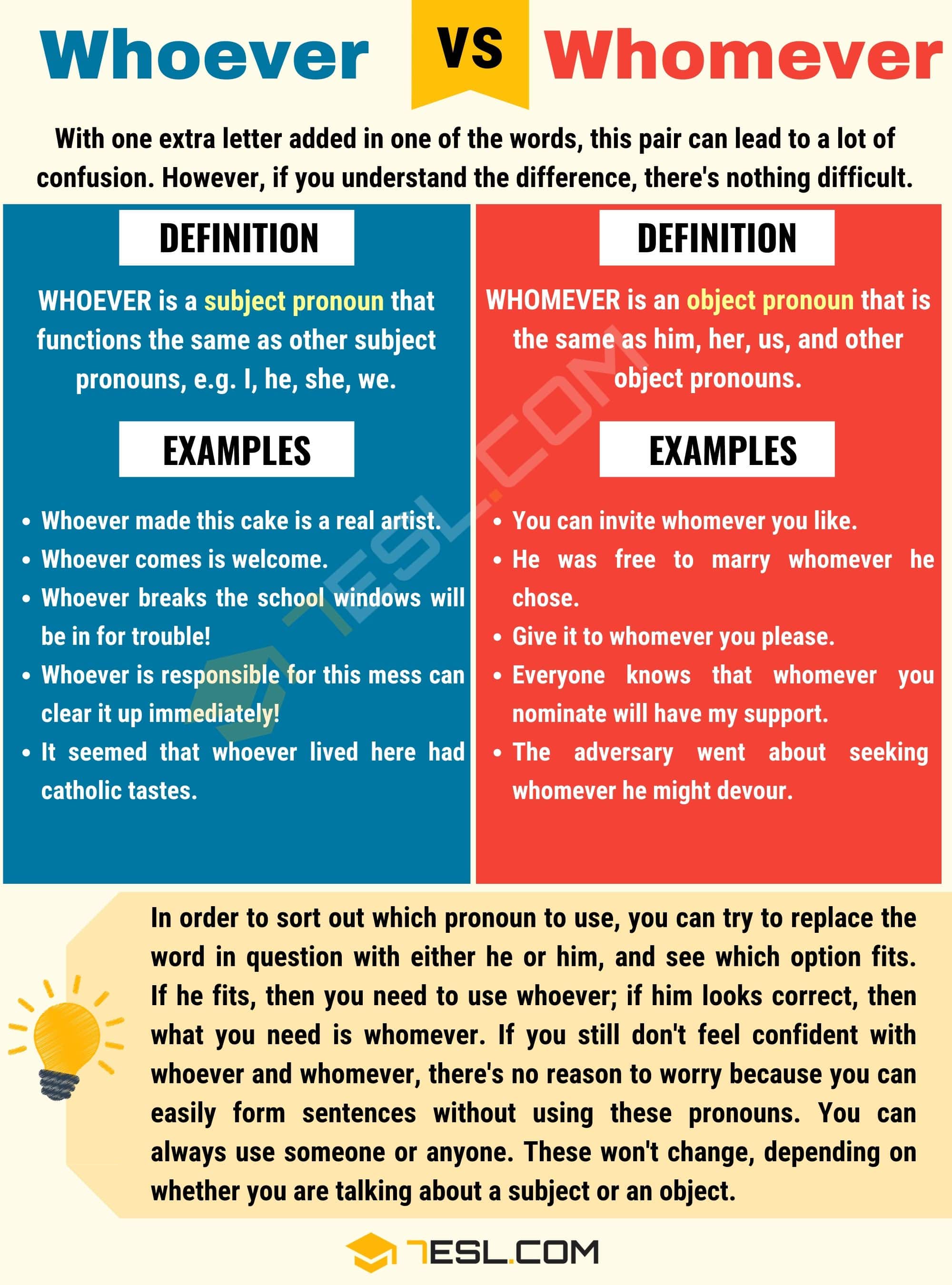Whomever or whoever: What is the difference?
Which of the following is correct?
Tsai Ing-wen said she would run with (whoever/whomever) was ready.
Professor Gem is a friend to (whoever/whomever) she meets.
To know if you answered the two questions correctly, please read thoroughly the discussion.
The easiest way to know when to use the pronouns “whoever” and “whomever,” is to use the following key:
📌whoever ➡️ she, he, I, they
📌whomever ➡️ her, him, me, them
Follow the following steps to clearly answer the given questions.
Let's start!
🔴🟡 🟢
Question 1. Tsai Ing-wen said she would run with (whoever/whomever) was ready.
Step 1. Cover up the part of the sentence before “whoever/whomever.”
From: Tsai Ing-wen said she would run with (whoever/whomever) was ready.
✍️To: (whoever/whomever) was ready.
Step 2: For the remaining part of the sentence, test with a pronoun using the above key. Replace “whoever” with “she”; replace “whomever” with “her.”
Result:
📌Whoever was ready ➡️She was ready
📌Whomever was ready ➡️ Her was ready
Step 3: Consider which one sounds correct.
Note that the pronouns “she” and “he” are subjects of sentences, and the pronouns “her” and “him” are part of the objects of sentences.
✔️️ “She was ready” is the correct wording.
Step 4: Because “she” works, the correct pronoun to use is “whoever.”
✔️Final Answer:
Danielle said that she’d run with

was ready
Great! Are you still confused? Reach me by visiting https://en.amazingtalker.com/teachers-and-tutors/ryan-gem-matin-ao🔴🟡 🟢
Question 2.
Professor Gem is a friend to (whoever/whomever) she meets.
Step 1. Cover up the part of the sentence before “whoever/whomever.”
From: Professor Gem is a friend to (whoever/whomever) she meets.
✍️To: (whoever/whomever) she meets.
Step 2: Because the remaining part of the sentence has a subject (she) at the beginning, test with the pronouns at the end of the sentence. Replace “whoever” with “they”; replace “whomever” with “them.”
Result:
📌She meets whoever ➡️She meets they
📌She meets whomever ➡️ She meets them
Step 3: Consider which one sounds correct.
Note that the pronoun “they” is the subject of a sentence, and the pronoun “them” is part of the object of a sentence.
✔️️ “She meets them” is the correct wording.
Step 4: Because “them” works, the correct pronoun to use is “whomever.”
✔️Final Answer:
Professor Gem is a friend to

she meets.
❤️Summary❤️
Which of the following is correct?
Tsai Ing-wen said she would run with (whoever/whomever) was ready.
Answer: Whoever
Professor Gem is a friend to (whoever/whomever) she meets.
Answer: Whomever


Whomever is an object pronoun and works like the pronouns him, her, and them.
Whoever is a subject pronoun and works like the pronouns he, she, and they.
Whomever versus Whoever
Whomever example: Give the document to whomever in the department
Whoever example: Whoever wrote this poem should win a prize
Practice making a few sentences using each.
How to use Who vs Whom Correctly
What’s the difference between who and whom? These are two words that cause a lot of confusion, even for native English speakers. So, it’s well worth taking a few minutes to know the difference between the two.
Below, we’ve provided an easy guide on understanding the grammatical rules.
Who should be used to refer to the subject of a sentence.
Whom should be used to refer to the object of a verb or preposition.
Just be careful, because there is an exception: There is one context in which you should always use whom: after a preposition at the beginning of a sentence or clause. For example, To whom did you address that letter? (Not “to who”). And, My teacher, for whom I’m doing some research, is currently in a meeting. (Not “for who”).
The difference between who and whom explained:
The difference between “who” and “whom” is the same as the difference between “I” and “me;” “he” and “him;” “she” and “her;” etc.
"Who", like other pronouns such as: I he, and she, is a subject. So, it is the person performing the action of the verb. On the other hand, "whom", acts like me, him, and her in a sentence. It is the object. Therefore, it is the person to/about/for whom the action is being done.
Whom is also the correct choice after a preposition: with whom, one of whom, not “with who, one of who.”
Example sentences: Correct use of who
This is who warned me. (It is He/she warned me. Not “him/her” warned me)
Jack is the one who wants to go. (He/she wants to go. Not “him/her” wants to go)
I need to know who makes the final decision. (He/she makes the final decision. Not “him/her” makes the final decision).
I know who your best friend is! (He/she is your best friend. Not him/her is your best friend).
Example sentences: Correct use of whom
With whom am I speaking? (I am speaking with him/her. Not I am speaking with he/she)
To whom this may concern. (This concerns him/her. Not this concerns he/she)
A number of friends went to the cinema, one of whom was the birthday boy. (The birthday boy was one of them. Not the birthday boy was one of they.)
Actually, she knew very little about the man with whom she had promised to spend the summer. (She has promised to spend the summer with him. Not she has promised to spend the summer with he.)
Whoever is a related term of whomever.
Whomever is a see also of whoever.
As pronouns the difference between whomever and whoever
is that whomever is (formal) while whoever is whatever person or persons.
The difference between whoever and whomever is their use in a sentence.
Whomever is an object pronoun and works like the pronouns him, her, and them. For example, "Give the document to whomever in the department".
Whoever is a subject pronoun and works like the pronouns he, she, and they. For example, "Whoever wrote this poem should win a prize."
Whomever vs whoever
Level 1: 先明白Who 跟 whom 分別
在重屬句子中,who 是進行動作的人:
I have a sister. She loves ice-cream. 喜歡是 she 做的動作
I have a sister who loves ice-cream. who是用來取代she的。
在這個例子當中,She是進行動作的人,所以應用who取代。
'Who wants ice-cream?' dad asked.
'Me! I want ice-cream!' my sister shouted.
在重屬句子中,Whom 是沒有做動作的人:
She is a great singer. I admire her the most. 欣賞是 I 做的動作。
She is a great singer whom I admire the most. whom是用來取代her的。
在這個例子當中,her是沒有做動作的人,所以應用whom 取代。
'Whom do you admire the most?' dad asked.
'Her! I admire her the most!' I pointed at the video.
Level 2: Whoever 跟 whomever 分別
whoever 及 whomever 在中文都是解作 任何一個人。
但whoever是句子中有進行動作的人。
但whomever是句子中沒有進行動作的人。
In the first squid game, when red light was on, whoever moved will be killed.
在第一個魷魚遊戲裡面,當紅燈亮起時,任何一個人 移動都會被殺。
It doesn't matter whomever you kill. The police won't know.
你殺任何一個人 都沒有關係。警察不會知道
Whomever it is, I will find you!
那是任何一個人也好,我都會找到你!
任何一個人 在英文也有其他表達方法:
No matter who you are, I will find you!
無論你是任何一個人也好,我都會找到你!
Anyone can do! 任何一個人也可以!
Any one of you can do! 你們當中任何一個人也可以!
Whomever is an object pronoun and works like the pronouns him, her, and them. Whoever is a subject pronoun and works like the pronouns he, she, and they.
Give the document to whomever in the department is available.
Whoever wrote this poem should win a prize.
Object vs subject pronouns
The Rule: Who functions as a subject, while whom functions as an object. Use who when the word is performing the action. Use whom when it is receiving the action.
Some examples:
Who would like to go on vacation? (subject)
Who made these awesome quesadillas? (subject)
To whom was the letter addressed? (object)
Whom do you believe? (object)
The words "whoever" and "whomever" are often confused, with many people assuming that the latter is a more formal or correct version of "whoever." The misuse of "whomever" is so common that "The New Yorker" once published a list of examples under the title "The Omnipotent Whom." While these two words may seem confusing, there is an underlying rule that governs their proper use.
How to Use "Whoever and Whomever"
"Whoever" is a subject pronoun (just like "I," "he," "she," "they," and "who"). As a subject pronoun, it refers to the subject or actor in a sentence, the person who is performing the main action. For this reason, it works just like any other subject pronoun. You can use "whoever" in any context where you might also use "I," "she," "he," or "they":
"Whomever" is an object pronoun, which means you can use it in any place where you could also use "me," "him," "her," "them," or "whom." As object pronouns, these words refer to the object of a sentence, the person who is the recipient or target of an action:
Whoever
She is in charge over there.
Whoever is in charge over there?
Whomever
Give it to her.
Give it to whomever.
How to Remember the Difference
"Whoever" and "whomever" are different parts of speech. One way to remember the difference is with the mnemonic "hmmm." Would you say "I want him to do that errand" or "I want he to do that errand?" Since the first is correct, you should use "whomever." If you're confused about a sentence, try substituting another pronoun (such as "he" or "him") to determine whether you should use "whoever" or "whomever."
Use whomever if you don't know the person and Whoever is used when you have an idea who might be responding to your call.
When addressing the general population we use whomever and when we are talking to a group of people within an organization you already know we use whoever.
Examples
In a public rally:
Whomever has a problem with social services just let me know.
In a business meeting:
Whoever has a question about our agenda just let me know.
Whomever is used when we want to address and are talking in front of a general audience we never know personally and Whoever is used when we are talking to a group of people that we have already met or a team of people working on a common goal.
Whoever vs. Whomever
By: Teacher Sierra from AmazingTalker
Today, I will teach you whoever vs. whomever.
Before I teach you whoever vs. whomever, let’s review "who" and "whom".
Who
Who refers to the subject of the sentence. Who is asking a question to get information about the particular subject.
Examples
Example 1
Who is she?
Example 2
Who made these cookies?
Example 3
Who shall eat these cookies?
Whom
Whom refers to the object of the sentence. Sometimes, you will see whom used with prepositions.
To whom
For whom
With whom
From whom
Examples
Example 1
Whom am I speaking to?
Example 2
I don’t know whom I will go to the party with.
OR
I don’t know with whom I will go to the party. (very formal)
Example 3
Whom did you receive the letter from?
OR
From whom did you receive the letter? (very formal)
Since "whom" refers to the object of the sentence, you will also use "whom" to ask the subject pronoun about the object.
Examples
Example 1
Whom do you believe?
Note: “You” is a subject pronoun.
Example 2
Whom shall we see?
Note: “We” is a subject pronoun.
You can use “who” and “whom” as relative clause pronouns.
Examples
Who
Example 1
I don’t know who said that.
Explanation: We don’t know the person in the relative clause who said that. Therefore, we use "who".
Example 2
I don’t know who she is.
Explanation: Since we don’t know the person in the relative clause, we need to use “who”.
Example 3
Kathy is the girl who likes to draw!
Explanation: "Who" in this sentence is referring to the girl, Kathy, who likes to draw.
Example 4
Michael is the one who sold his blue car!
Explanation: "Who" in this sentence refers to Michael who sold his blue car.
Example 5
A cake decorator is someone who decorates cakes.
Explanation: "Who" in this sentence is explaining the information what a cake decorator does.
Example 6
A virologist is someone who studies viruses.
Explanation: "Who" in this sentence is explaining the information what a virologist does.
Whom
Example 1
I don’t know whom you are talking about.
Explanation: Since we have “you” as a subject pronoun in the relative clause and “about” as a preposition, we need to use “whom”.
Example 2
The author whom Mary criticized is very famous.
Explanation: Since we have “Mary” in the relative clause, we need to use “whom” to refer to the author she criticized.
Example 3
This is the person whom I saw eat all the pizza!
Explanation: Since we have the subject pronoun “I” in the relative clause, we need to use “whom” to refer to the person who ate all the pizza.
Now, since we have reviewed "who" and "whom", let’s talk about "whoever" and "whomever".
Whoever
Whoever is a subject pronoun. It works like the subject pronouns I, he, she, we, and they.
Examples
Example 1
Whoever made those chocolates is a great candy maker!
Explanation: We don't know who made the chocolates. Therefore, it could be I, he, she, we, or they who made the chocolates.
Example 2
Whoever wrote this is a great poet!
Whomever
Whomever is an object pronoun. It works like the object pronouns him, her, us, and them.
Example 1
Give the documents to whomever.
Explanation: The sentence doesn't specify whom to give the documents to. It could be him, her, us, or them to give the documents to.
Example 2
Report this information to whomever you find in the office.
How to know when to use who, whom, whoever, and whomever?
"Who" and "whom" refer to specific information. "Whoever" and "whomever", however, aren’t asking for specific information. Instead, "whoever" and "whomever" can be talking about anyone. Think about "whoever" and "whomever" are also giving some information.
Let’s look at some examples!
Examples
Example 1
Who made this chocolate?
Explanation: The sentence specifically would like to know the person who made the chocolate.
Whoever made this chocolate is a great candy maker!
Explanation: This sentence isn’t asking a question. In this sentence, someone ate the chocolate and gave a compliment. Anyone could have made this chocolate.
Example 2
Whom to give this letter to?
Explanation: The sentence specifically would like to know “whom” to give the letter to.
Give the letter to whomever.
Explanation: It doesn’t matter “whom” to give the letter to. Therefore, give it to “whomever” you would like to give the letter to.
Example 3
Who won first place in the race?
Explanation: The sentence is specifically asking about the person “who” won first place.
Whoever wins first place in the race will get a $5,000 prize!
Explanation: One of the contestants “who” wins first place in the race will get a $5,000 prize.
Example 4
Who is she?
Explanation: This is specifically asking for information about the person.
Whoever she is, she must be rich.
Explanation: Not asking for specific information. This person is assuming the person is rich by the clothes and accessories.
Example 5
Who parked their car here? Their car will be towed.
Explanation: Asking for specific information to know who parked their car in that particular area.
Whoever parked their car here, their car will be towed.
Explanation: Not asking for specific information. The person is warning that the person’s car will be towed because that car shouldn’t be parked at that particular location.
Example 6
I don’t know whom I’m going to the party with.
Explanation: The person is trying to decide “whom” to go to the party with.
Whomever I go to the party with, I hope we have fun!
Explanation: This person is not really deciding “whom” to go to the party with. The person is just concerned whether or not they will like the party.
Example 7
I don’t know whom to share my cake with.
Explanation: The person would like to know a specific person to share the cake with.
Whomever I share my cake with, I hope they like it!
Explanation: The person isn’t looking for a specific person to share the cake with. The person is only concerned about the person liking their cake.
"Who" and "whom" refer to specific information. "Whoever" and "whomever", however, aren’t asking for specific information. Instead, "whoever" and "whomever" can be talking about anyone. Think about "whoever" and "whomever" are also giving some information whereas "who" and "whom" are receiving information.
Examples
Example 1
Who is she?
Explanation: Would like to receive some information about the person.
Whoever she is, she must be rich.
Explanation: Giving out information.
Example 2
Some people think an artist is someone who only draws or paints. An artist is someone who draws, paints, does sculpture, etc. An artist sometimes does specific jobs, such as animation, comic art, graphic design, etc.
Explanation: Receiving information about the description of an artist.
Whoever is an artist, I’m sure the person does great artwork!
Explanation: Giving out information that the artwork must be great because the person is an artist.
Example 3
Whom to give the letter to?
Explanation: Would like to receive some information on whom to specifically give the letter to.
Give it to whomever.
Explanation: Giving out information on whom to give it to, which is whomever you wish.
Practice Time
Can you think of some sentences using who, whom, whoever, and whomever?
they = whoever
Give it to whoever/whomever asks for it first.
They ask for it first. Therefore, whoever is correct.
them = whomever
We will hire whoever/whomever you recommend.
You recommend them. Therefore, whomever is correct.
You might have seen the word "whomever" at some point, so what is it and how is it different from "whoever"?
Meaning:
"whoever" and "whomever" mean the same thing as each other.
Similarly, "who" and "whom" mean the same thing as each other.
Formality:
"whom" and "whomever" are extremely formal, very few people use these words, even if they understand their grammatical usage.
Grammar:
"whom" and "whomever" are only used when they are the object of the sentence or after a preposition.
Examples:
It is tradition to bestow the prize on whomever arrives first.
We will employ whomever is the most qualified for the position.
One may take whomever one pleases to the event.
The difference between whoever and whomever is their use in a sentence. Whoever is used as a subject pronoun, while whomever is an object pronoun.
whoever VS whomever
If the pronoun is the subject of that verb, use "whoever."
If it is the object of that verb, use "whomever":
Example:
Tell whomever you know.
May I speak to whoever is in charge of this project, please?

“Whoever vs Whomever” – When To Use These Two Words?
Whoever is a subject pronoun. This means that it can replace pronouns like I, we, she, he, and they that are often the subject of a sentence.
Whomever is an object pronoun. This means that it can replace pronouns like me, us, her, him, and them that are often the object of a sentence’s preposition or verb.
Here’s a quick trick to remember the difference: If you’re referring to the pronoun him/her, you should use whomever. However, if he/she works better in the sentence, you should opt for whoever.
You can begin a sentence using whomever if the object pronoun naturally falls at the beginning of the sentence.
Whomsoever is a more formal word for whomever.
Whosoever is a more formal word for whoever.
Some modern grammarians believe whom is a dying pronoun, joining words like thee, thy, and thine.
Whomever made this salad is a culinary genius!
Whoever made this salad is a culinary genius!
Please make sure to give these supplies to whoever needs them most.
Please make sure to give these supplies to whomever needs them most.
If you find yourself changing sentences around to avoid using these words, you aren’t alone. But there is another way. Knowing whether to use whoever or whomever can be easy once you know what makes them unique. This article will answer all of your whoever vs. whomever questions and give you a few simple tricks to remember the difference between these pronouns. And, we’ll show you how to use each with easy examples.
Whoever is a subject pronoun. Meanwhile, whomever is an object pronoun.
Many people believe that whomever is nothing more than a more formal version of whoever. But the truth is, they’re unique words with unique functions. So, what’s a writer to do if they’re deciding between whomever or whoever?
Which is Correct: Whoever or Whomever?
Here is the easiest way know if you should use whoever or whomever: associate the ‘m’ in whomever with the ‘m’ in him. Replace the word with him. Does the sentence still make sense? If so, then whomever is the correct pronoun. If not, then you should use whoever instead. This trick works because whoever is a subject pronoun like he/she/they. Conversely, whomever is an object pronoun like him/her/them.
Similarly, you can use the same trick to remember the difference between who and whom. This is because these pronouns are the roots of whoever and whomever.
Whoever and whomever are interrogative pronouns. Although they both relate to people, they aren’t interchangeable. Instead, they serve different functions in sentences.
She shoveled snow off the sidewalk.
Who shoveled snow off the sidewalk out front?
Whoever shoveled snow off the sidewalk did a great job.
The letter was addressed to him.
To whom was the letter addressed?
The letter should go to whomever it was addressed.
Pro Tip: When choosing whomever or whoever, pay attention to the clause that includes the word, rather than the entire sentence.
Whoever and whomever are interrogative pronouns.
What is the Him Trick?
The Him Trick is the quickest and easiest way to remember the difference between whoever and whoever. Just link the ‘m’ in whomever to the ‘m’ in him. Replace the entire dependent clause beginning with whoever/whomever with him (The smoothie goes to whomever ordered it = the smoothie goes to him). Does the sentence still make sense? Is it still grammatically correct? If yes, then you know that whomever is the correct word to use. If no, then whoever is most likely the word you want. You can also use other object pronouns like her/them.
The reason this trick works is because whomever is an object pronoun like him/her/them. Conversely, whoever is a subject pronoun like he/her/they.
The money should go to whoever/whomever needs it most.
The money should go to him/he.
Here’s how the sentences look like following the Him Trick:
The money should go to him.
The money should go to whomever needs it most.
Whoever/Whomever is in charge of the third shift should report in at noon.
He/him should report in at noon.
He should report in at noon.
Whoever is in charge of the third shift should report in at noon.
Can you Start a Sentence With Whomever?
You can start a sentence with whomever, but it rarely happens. Use whomever at the beginning of a sentence when the object pronoun—the recipient of the action—falls at the beginning of a sentence. In this case, it’s grammatically correct to start a sentence with whomever. An example of one of these rare cases is: Whomever you choose for the role, it’s fine with me.
Whoever the committee nominates to run the fundraiser, we will support the decision.
Whomever the committee nominates to run the fundraiser, we will support the decision
When Should you use Whomever in a Sentence?
You should use whomever in a sentence whenever you can rewrite the sentence using him. For example, the sentence “Please send the file to whomever requested it” becomes “Please five the file to him.” This is because whomever is an object pronoun, meaning that it refers to the verb or preposition of a sentence and not the subject. In this example, the subject is the file while the object is the person who requested the file. Since the verb send and the preposition to refer to the person that made the request, whomever is the correct object pronoun to use. As you can see, you should use an object pronoun to replace the entire dependent clause beginning with whomever.
Whomever is an object pronoun like him/her/them. Meaning, it refers to the object of the sentence.
Examples of Whomever in a Sentence
Here are examples of how to use whomever in a sentence:
I will give a name tag to whomever needs one.
Mrs. Garner would like to speak to whomever is in charge.
Please deliver the package to whomever it’s addressed.
I’d love to hug whomever made this cake!
The police plan to arrest whomever defaced this wall.
Whom/Whomever Recap:
Whom serves as an object pronoun because it receives the action.
As such, whom takes the place of other object pronouns like me, us, her, him, and them.
Since it’s also an object pronoun, the same is true for whomever.
Examples of Whoever in a Sentence
Here are examples of how to use whoever in a sentence:
Whoever helps you with the research should have an advanced understanding of physics.
Whoever the thief was, he was not from this area.
Who/Whoever Recap:
[example]Whoever you are, do not call my office again![/example]
Who functions as a subject pronoun because it refers to the person executing the action of the sentence.
As such, who takes the place of other subject pronouns like I, we, she, he, and they.
Since it’s also a subject pronoun, the same holds true for whoever.
Why Did You Need To Know The Difference?
The use of the two sentences is quite different from each other. Therefore, you have to know the accurate meaning and difference between the two words, whoever vs whomever, to rectify your sentence construction errors quickly.
Key Points Of Difference Between Whoever Vs Whomever
Whoever is a subjective pronoun.
Whomever is an objective pronoun.
For describing the unknown person, the word whoever is applicable.
Whomever can have the application either with a preposition or with a verb.
The letter M has the word whomever, and it is not present in the word whoever.
These are some of the core points of difference between the two sentences. You have to understand the differences before making the application of the two concepts. Do not mix up or jumble up the two concepts with one another. Make sure you do not get confused between the two concepts.
WHOEVER?! WHOMEVER?! WHICH ONE?!
Whomever is an object pronoun and works like the pronouns him, her, and them (Give the document to whomever in the department).
Whoever is a subject pronoun and works like the pronouns he, she, and they (Whoever wrote this poem should win a prize).
SUBJECT AND OBJECT
Subject: the action is being done by the subject
Sarah and her friends will cook the food.
Subject: Sarah and her friends
Object: the action is done unto the object
Sarah and her friends will cook the food.
Object: food
CONCLUSION
If the pronoun is the subject of that verb, use "whoever." If it is the object of that verb, use "whomever":
The prize should be given to whomever.
The prize should be given to whoever wins the race.
whomever or whoever what is the difference?
Whomever is an object pronoun and works like the pronouns him, her, and them (Give the document to whomever in the department). Whoever is a subject pronoun and works like the pronouns he, she, and they (Whoever wrote this poem should win a prize).
When can you use the word Whomever?
If the pronoun is the subject of that verb, use "whoever." If it is the object of that verb, use "whomever":
The prize should be given to whomever.
The prize should be given to whoever wins the race
Choosing whoever or whomever can be easy. Whomever is an object pronoun and works like the pronouns him, her, and them (Give the document to whomever in the department). Whoever is a subject pronoun and works like the pronouns he, she, and they (Whoever wrote this poem should win a prize).
I wouldn't focus on whomever too much...
Whomever VS. Whoever
In short, 'whomever' is an object pronoun so it works like 'him' or 'her' and 'them' where 'whoever' is not and it works more like 'he,' 'she,' or 'they.'
However! The most important part: In modern English we do not use 'whomever.' It is an increasingly literary and increasingly obsolete word.
Examples:
Whoever wants to go to the party with me, let me know soon.
I will go with whomever wants to go.
In the modern world... just use 'whoever.'
In modern spoken English we will use 'whoever' in both cases, there's no point to learn 'whomever' unless you plan on taking some English tests or doing professional English writing.



















